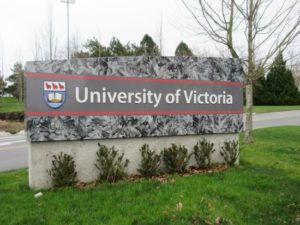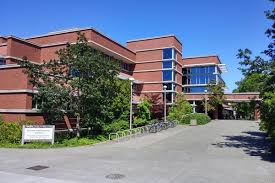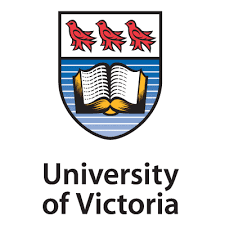University of Victoria

University of Victoria
Location: Greater Victoria, British Columbia, Canada
Foundation Year: 1963
Type: Public
Tuition Fees: from 19,536 CAD to 24,926 CAD per year
The University of Victoria, also known as UVic or Victoria, was founded in 1963. Today, its dynamic academic environment has made UVic one of Canada’s leading research-intensive universities. Located in Victoria, on the British Columbia coast, the university nurtures the atmosphere of discovery, innovation, and creativity. Community engagement is seen as a key part of its success and sustainability as a key part of every major field at UVic, starting from Clean Energy to Oceans and Climate.
The University of Victoria is proud of its active partnership agreements with over 300 post-secondary institutions located worldwide. UVic ranks among the world’s best and most internationally-engaged research universities, which addresses some of the most relevant social, economic, and environmental challenges. Eight internationally-recognized areas of research strength at the University of Victoria include Creativity and Culture, Data Science and Cyber-Physical Systems, Environment, Climate and Energy, Health and Life Sciences, Global Studies and Social Justice, Ocean Science and Technology, Indigenous Research, and Physical Sciences and Engineering, Mathematics and Computer Science. It is worth mentioning, that UVic`s instructors are well-represented among the winners of prestigious national Society for Teaching and Learning in Higher Education 3M teaching fellowships, and more than forty faculty members have been named as fellows of the Royal Society of Canada.
The University of Victoria attracts students, faculty, and staff from 118 different countries of the world, the number of international students exceeds 4,000. The institution consists of ten faculties: the Faculty of Business, the Faculty of Education, the Faculty of Engineering, the Faculty of Fine Arts, the Faculty of Human and Social Development, the Faculty of Humanities, the Faculty of Law, the Faculty of Science, the Faculty of Social Science and the Faculty of Graduate Studies.
The University of Victoria has one of Canada’s largest university co-operative education programs and provides more than 4,200 placements each year. Co-op integrates academic studies with relevant paid work experience, giving UVic undergraduates unique hands-on experience in their field. More than 75 percent of them graduate with relevant job offers.

Another benefit of studies at Victoria is the Jamie Cassels Undergraduate Research Awards program. Each year, one hundred undergraduates from different faculties pursue independent research with the guidance of a faculty supervisor and gain direct research experience in their field. Field schools also provide a transformative learning experience for UVic students and faculty, allowing them to fully appreciate the practical side of research and data analysis. Uvic`s students travel, conduct research, and work with local and international communities. The President’s Beyond Borders Fund provides them with funding for traveling in the Asia-Pacific region, including support for internships, field schools, and co-op placements. The Learning and Teaching in Higher Education program at the University of Victoria prepares graduate students for an academic career in higher education, helps to build their teaching portfolios, and gain relevant experience.
The choice of Victoria`s Degree, Minor, Diploma, Certificate, Interdisciplinary or Distance Undergraduate programs includes Anthropology, Applied Ethics, Applied Lingusitics, Art History and Visual Studies, Arts of Canada, Astronomy, Biochemistry, Chemistry, Biology and Earth Sciences, Biology and Mathematics and Statistics, Biomedical Engineering, Business, Canadian Studies, Chemistry and Mathematics, Chemistry and Ocean Sciences, Child and Youth Care, Chinese Studies, Civil Engineering, Coastal Studies, Commerce, Computer Engineering, Computer Science and Health Information Science, Computer Systems, Creative Writing, Cultural Resource Management, Digital and Interactive Media in the Arts, Earth Sciences, Economics, Education, Electrical Engineering, Electrical Systems, English, Environmental Studies, European Studies, Film Studies, Financial Mathematics and Economics, Foundations in Indigenous Fine Arts, French, Gender Studies, Geography, Germanic Studies, Greek and Latin Language and Literature, Health and Community Services, Health and Society, Hispanic Studies, History, Human Dimensions of Climate Change, Indigenous Studies, Intercultural Education, Japanese Studies, Kinesiology, Latin American Interdisciplinary studies, Law, Linguistics, Mathematics, Mechanical Systems, Medieval Studies, Microbiology, Museum Studies, Music, Nursing, Ocean Sciences, Pacific and Asian Studies, Physics, Political Science, Professional Communication, Professional Writing in Journalism and Publishing, Psychology, Sociology, Religion, Culture and Society, Statistics, Teacher Education, Technology and Society, Theatre, Visual Arts, Writing and many others. The number of Graduate programs at the University of Victoria exceeds 160, including Masters and Doctorate programs. They cover the areas of Business, Economics and Law, Education and Family, Engineering, Math and Technology, Environment and Sustainability, Fine Arts and Digital Media, Health and Life Sciences, Indigenous Focus, Languages and Global Cultures, People and Society, and Physical Sciences.
The University of Victoria has a wide range of exchange and study abroad agreements with universities around the world. Visiting students can take courses that will count as credit toward the program at their home institutions in the fields of Business, Humanities, Science and Social Sciences, Law, and others.
To attend UVic, all applicants must demonstrate English language proficiency through academic studies, English language proficiency tests, or programs offered by UVic's English Language Centre. It has offered intensive English programs for fifty years and is now one of the largest on-campus English schools in Canada. Each year close to 2,500 students from more than 35 countries of the world join programs that last from one to three months or longer, depending on students` needs and goals. TESOL-trained instructors with international teaching experience, in-house homestay staff, and activity coordinators guarantee 24/7 student support and academic mentoring in all programs. The English Language Centre also offers Pathways to University of Victoria Degree programs and boasts over one hundred university partnerships in ten countries. Central location on UVic’s beautiful campus and monthly program start dates are additional benefits to consider.
The University of Victoria has a wide range of entrance scholarships to academically outstanding international undergraduate students that range in value from 3,000 CAD to 10,000 CAD.
The University of Victoria provides on-campus living, but the number of rooms is limited. The options available include single rooms, double rooms, apartments, or townhouses with three roommates, meal plans are optional. It is also worth mentioning, that UVic is planning for new student housing that will provide on-campus housing for approximately 600 new UVic students.
Tuition Fees for the international students at UVic vary depending on a chosen program and its duration and start from 19,536 CAD to 24,926 CAD per year.
Regards,
International Experience Club

